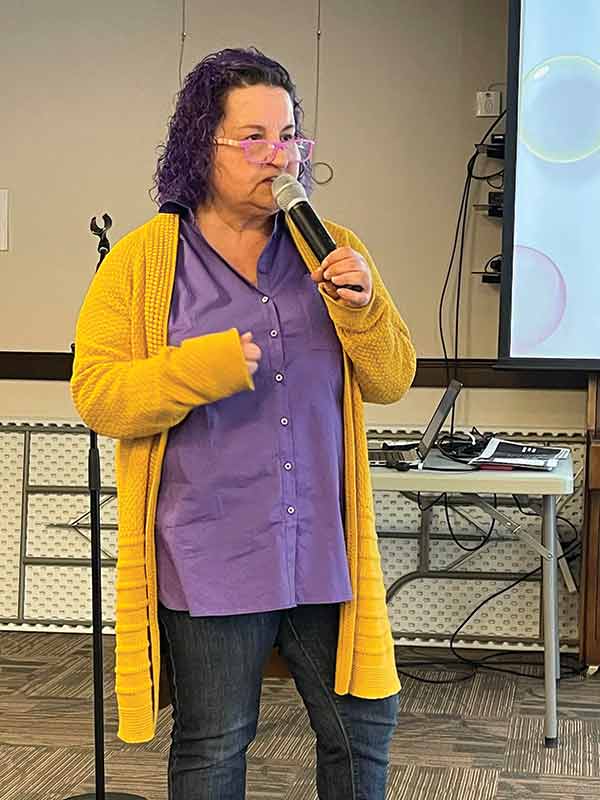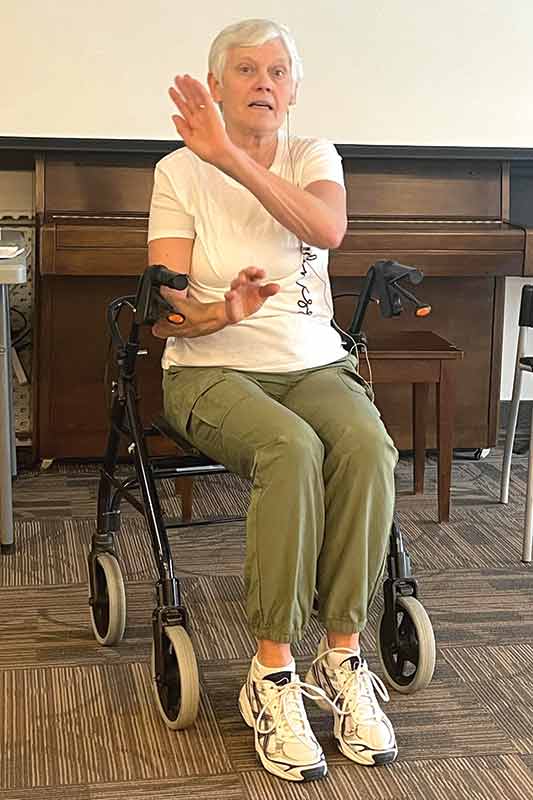Organizers of the Healthy Living Forum in Altona are thrilled with the turnout at the Gardens on Tenth on Jan. 24.
The forum was intended for people of all ages, with topics such as coping with anxiety, empowering independence, financial strategies, palliative care, Alzheimer’s, and supporting the Altona Community Foundation.
In her presentation, Tami Giesbrecht, Outreach Worker for the Anxiety Disorders Associations of Manitoba (ADAM) shared a variety of contributing factors to developing anxiety, including genetic disposition, learned behaviour, negative experiences and stress.
“Exploring the reasons why we have anxiety may be important, but it is even more necessary to find ways to cope,” she said.
Untreated anxiety, Giesbrecht explained, can lead to other issues such as substance misuse, self-harm behaviours, and increased risk for diseases such as diabetes and heart problems, as well as a negative impact on relationships.
Coping with anxiety is a lifestyle, Giesbrecht said, and things like education and awareness play a big part in managing it. Finding people and resources you can trust, and understanding the triggers and symptoms and causes are vital.
Along with journaling, Giesbrecht provided a number of coping skills, including the STOP method, which involves stopping what you’re doing, taking a breath, observing what is happening within and around you, and then proceeding with what you were doing.
“It grounds us in the present moment and is a very good coping method if you start to feel your anxiety is starting to escalate.”
Giesbrecht also recommends that people learn how to breathe properly.
“Almost everybody chest breathes. That’s not the way we were designed. Everybody should practice breathing through their diaphragm. That actually gives us more oxygen.”
She concluded with a reminder that no matter how bad your day is, “It’s never too late to restart your day.”
In her presentation, regional palliative care coordinator Shannon Reimer discussed attitudes about death and dying in society.
“It can be a scary topic. Palliative care used to mean end of life care. Now it has expanded, to include the whole last chapter, which improves the quality of individuals and families facing a life-limiting illness,” she said. “We aim to improve quality of life, managing not only physical pain, but emotional, spiritual, and cultural pain, all of which are important to our quality of life. It’s not just about the patient, it’s also about the patient’s family. It’s an approach that focuses on quality.”
She added that palliative care is not meant to shorten or extend life.
“What we do is talk about goals of care. These discussions are about what’s important to you, what are your strengths, your fears, and your worries. How much you know, and how much you want to know. Focusing on quality often starts with those conversations.”
Presenter Theresa Figurski from the Altona Yoga studio offers sessions at the Apartments at the Gardens every second Wednesday. She led forum attendees through a variety of movements.
“There are many benefits to this, at any age,” she said. “It’s a mind-body connection in the path to self-realization. There’s a plethora of benefits for your health, from lowering blood pressure and stress, strengthening muscles, elevating mood, helping sleep and digestion. Our body just wants to work for us. It’s just a matter of what we’re putting in and how we treat it.”
Understanding Dementia was the title for the presentation by Rebecca Atkinson, regional coordinator for the Alzheimer’s Society of Manitoba.
She explained what it’s like to live with dementia, and the best ways for individuals and the community to provide care for those who have it.
“We are here to support you, and you do not have to go through this disease alone. Wrap yourself in a circle of support and really make sure you have people with you along this journey.”
She explained how dementia is the umbrella term for over 130 different brain change diseases, including Alzheimer’s disease, which is the most common.
Atkinson also emphasized the importance of understanding what a diagnosis means.
“At least two parts of your brain are actively dying. The palliative connection is huge. The earlier you start to process this and have conversations about what you want life to look like with quality all the way to the end, the better. We need to talk about that as soon as the signs arrive.”
She noted that 61 per cent of the people living with dementia in Manitoba are still living at home. “This means that all the care is often provided by spouses, friends, and family. So, there is a huge demand for support to care partners, and the Alzheimer’s Society is very important for care partners.”
Dementia is on the rise. About 62 per cent of Manitobans have a family member or friend with dementia. Currently there are 19,600 people living with it in Manitoba. That number is expected to rise to over 39,000 by 2050. “Our brains are changing. A lot of the causes are still unknown. Genetics only play a small part.”
As cognitive abilities change, Atkinson said for the care partner or loved one, the important thing is not whether the person living with dementia is accurate, but that their self-esteem and dignity are maintained. Things like effective communication and strategies are the key.
“Our most important task is to establish and nurture a relationship of mutual respect and trust. This includes things like being prepared by getting to know the person, using routines to create a supportive environment, recognizing emotions, and keeping your own emotions in check when the going gets tough.”
Photos by Lori Penner/Voice


